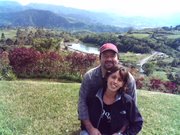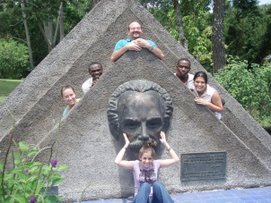Well, I'm finally caught up on old journal entries and other assorted thoughts I wanted to transfer into here. Now, unfortunately it is time to roll my sleeves up and dive into that big tank-o-jell-o that I call my thesis.
I've promised myself no more idle blogging unless I've put in at least as much time polishing up my thesis. This means I won't be here as much, and I'll be way more invested in my Thesis Progress Blog: Deliberative Environmental Governance.
Please come over, post comments, frown at my bizarre ideas, light votive candles to Saint Jude (or to Sherab Chamma), whatever works!!
The link to that other blog is:
http://deliberativegreen.blogspot.com/
(or just click on the title to this article)
Hope to have you over for coffee and to being enriched by your input.
Garuda / Sergio.
domingo, 3 de junio de 2007
sábado, 2 de junio de 2007
Manual de Colaboración / Collaboration Handbook
One of my most satisfying accomplishments in 2006 was the design and completion of five training workshops with the multi-stakeholders of participatory management of Wildlife Protected Areas in different Central American countries. This work was done under a contract between CEDARENA (Costa Rica's Environmental Law Center) and the International Union for the Conservatin of Nature, with the support of the European Union.
I was lucky, in the implementation of this project, to have a chance to work with my colleague and longtime friend, Fran Paniagua, who took some time off from his Ph.D. studies at the University of Florida to co-design and co-facilitate the workshops wit me. The workshop participants in each country were extremely generous, supportive and patient with us, and provided extremely valuable insights that helped us refine our methodology.
The workshop methodology was documented in a 24-minute DVD. Once the project was completed, Fran and I felt it would be a worthwhile effort to compose a handbook laying out the design and basic concepts of the workshops.
In my opinion, the handbook made two significant contributions: integrating diverse skills (communication, facilitation, negotiation) under a common thread in a way that can be relevant on-the-ground conservation stakeholder concerns, and its proactive framing of the learning process as collaboration, rather than resolving conflict. The handbook's pdf file (Spanish edition only) can be accessed at this address
http://tinyurl.com/comanejo
(or by clicking on the title to this article).
--------------------------------------------------------------------------------
Uno de mis logros más satisfactorios en el 2006 fue el diseño y ejecución de cinco talleres de capacitación con multiples actores del manejo paticipativo de Areas Silvestres Protegidas en diversos países centroamericanos. Estre trabajo se ejecutó bajo un contrato entre CEDARENA (una O.N.G. de Derecho Ambiental de Costa Rica) y la Unión Internacional para la Conservación de la Naturaleza, con el apoyo de la Unión Europea.
Tuve la fortuna, en la realización de este proyecto, de trabajar con my colega y amigo de muchos años, Fran Paniagua, quien se dio un descanso de sus estudios de doctorado en la Universidad de Florida para co-diseñar y co-facilitar estos talleres conmigo. Los participantes en cada país fueron extremadamente generosos, apoyaron mucho el proceso y nos tuvieron gran paciencia, además, nos aportaron sus puntos de vista extremadamente valiosos para depurar la metodología.
La metodología del taller fue documentada en un DVD de 24 minutos. Una vez que el proyecto había sido desarrollado en su totalidad, Fran y yo consideramos que valdría la pena preparar un manual que detallara el diseño y los conceptos básicos de los talleres.
En mi opinión, el manual hace dos contribuciones relevantes: la integración de diversas destrezas (comunicación, facilitación negociación) bajo un hilo común que pueda ser relevante a los intereses locales de los actores de la conservación, y su planteamiento proactivo del proceso de aprendizaje como colaboración, en lugar de formularlo como la resolución de conflictos. El archivo en formato pdf del manual (unicamente disponble en español) puede accesarse en la dirección
http://tinyurl.com/comanejo
(o siguiendo el vinculo en el titulo de este articulo)
I was lucky, in the implementation of this project, to have a chance to work with my colleague and longtime friend, Fran Paniagua, who took some time off from his Ph.D. studies at the University of Florida to co-design and co-facilitate the workshops wit me. The workshop participants in each country were extremely generous, supportive and patient with us, and provided extremely valuable insights that helped us refine our methodology.
The workshop methodology was documented in a 24-minute DVD. Once the project was completed, Fran and I felt it would be a worthwhile effort to compose a handbook laying out the design and basic concepts of the workshops.
In my opinion, the handbook made two significant contributions: integrating diverse skills (communication, facilitation, negotiation) under a common thread in a way that can be relevant on-the-ground conservation stakeholder concerns, and its proactive framing of the learning process as collaboration, rather than resolving conflict. The handbook's pdf file (Spanish edition only) can be accessed at this address
http://tinyurl.com/comanejo
(or by clicking on the title to this article).
--------------------------------------------------------------------------------
Uno de mis logros más satisfactorios en el 2006 fue el diseño y ejecución de cinco talleres de capacitación con multiples actores del manejo paticipativo de Areas Silvestres Protegidas en diversos países centroamericanos. Estre trabajo se ejecutó bajo un contrato entre CEDARENA (una O.N.G. de Derecho Ambiental de Costa Rica) y la Unión Internacional para la Conservación de la Naturaleza, con el apoyo de la Unión Europea.
Tuve la fortuna, en la realización de este proyecto, de trabajar con my colega y amigo de muchos años, Fran Paniagua, quien se dio un descanso de sus estudios de doctorado en la Universidad de Florida para co-diseñar y co-facilitar estos talleres conmigo. Los participantes en cada país fueron extremadamente generosos, apoyaron mucho el proceso y nos tuvieron gran paciencia, además, nos aportaron sus puntos de vista extremadamente valiosos para depurar la metodología.
La metodología del taller fue documentada en un DVD de 24 minutos. Una vez que el proyecto había sido desarrollado en su totalidad, Fran y yo consideramos que valdría la pena preparar un manual que detallara el diseño y los conceptos básicos de los talleres.
En mi opinión, el manual hace dos contribuciones relevantes: la integración de diversas destrezas (comunicación, facilitación negociación) bajo un hilo común que pueda ser relevante a los intereses locales de los actores de la conservación, y su planteamiento proactivo del proceso de aprendizaje como colaboración, en lugar de formularlo como la resolución de conflictos. El archivo en formato pdf del manual (unicamente disponble en español) puede accesarse en la dirección
http://tinyurl.com/comanejo
(o siguiendo el vinculo en el titulo de este articulo)
Wut u want...
(There's two more things I want to post from old journals and projects, then I can focus on the present and sharing a little more about my thesis and about how life looks downstream from a UPEACE M.A.)
I got these seven questions from a workshop on holistic hypnotherapy with Makarand, a transpersonal psychologist and body-worker, about 10 to 12 years ago.
Used in sequence, they may help arrive at greater clarity about what you want, and about the steps you can follow to achieve that.
1. What do you want?
2. How would you know that you have received what you want?
3. How would your life be different when you get it?
4. Is there any situation where you don’t want this thing/person/behaviour?
5. What resources do you need in order to get this specific outcome?
6. Is there anything you might lose when you finally get what you want?
7. What is stopping you from getting it right now?
I got these seven questions from a workshop on holistic hypnotherapy with Makarand, a transpersonal psychologist and body-worker, about 10 to 12 years ago.
Used in sequence, they may help arrive at greater clarity about what you want, and about the steps you can follow to achieve that.
1. What do you want?
2. How would you know that you have received what you want?
3. How would your life be different when you get it?
4. Is there any situation where you don’t want this thing/person/behaviour?
5. What resources do you need in order to get this specific outcome?
6. Is there anything you might lose when you finally get what you want?
7. What is stopping you from getting it right now?
Suscribirse a:
Comentarios (Atom)


